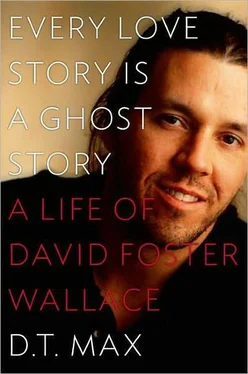Wallace was used to contradictions, both in his life and in his work, by now. But he could not pretend after all these years that his real work was going well. He told Michael Pietsch that he had completed “two hundred pages, of which maybe forty are usable.” He wrote Franzen at the beginning of 2006 that he had to get serious again in late January, and then again, when he didn’t, in the fall.
In September 2006, Green and Wallace adopted a two-year-old dog, whom they named Bella. “It’s…part-Rottweiler, part Lab (?) or Boxer (?)…. Very good-hearted, patient, and smart in dealing with Werner,” Wallace wrote Franzen. Though Wallace saw Werner as the boss, their friends laughed to see his first female dog subtly take over the pack. Bella made Wallace feel his family was complete again. Yet the specter of his unfinished work was never far from his thoughts. The Pale King was wildly overdue now, though the only deadline was in his own mind, since there was no contract. When Little, Brown had invited him to a celebration for the tenth anniversary of Infinite Jest in 2006—the book was to be reissued with an introduction by Dave Eggers — he had declined, telling Michael Pietsch he was “deep into something long, and it’s hard for me get back in it when I’m pulled away.” The next year the New School invited him for a commemoration. “The idea of coming to NYC is appealing,” he wrote to Franzen. “The idea of doing any more public events around a book I don’t remember is not.”
Stymied in the composition of the novel, Wallace threw his energy into research, though he knew the danger that posed. 14But he still wanted to be first in his class. The value of meditation and emptying the mind continued to play a key role in The Pale King ; Wallace still wasn’t sure he understood Buddhism and its practices. He began a correspondence with Christopher Hamacher, a young man who had read his Kenyon address and traced some of its roots to Buddhist thinking. Wallace peppered his correspondent, a practicing Zen Buddhist, with questions. He asked about authors he should seek out, mentioning books by Alan Watts, Eckhart Tolle, and Jiddu Krishnamurti. His friend told him don’t read, just do: “It’s absolutely wonderful that you don’t ‘know’ anything about zen.” Wallace wondered was he letting himself off easy when he meditated: “Is it OK to sit in a chair? Or is severe pain part of the (non-) point?” he asked. “What about a ‘meditation bench’ that lets you kneel with a straight back? Is it half-lotus or nothing? If so, why?” His new friend told him that the lotus position was preferable and the pain would pass, but to use his common sense. Wallace then confessed that there were many times when he didn’t much want to sit or sat only briefly. “You’re not going to hell if you only sit 15 minutes, sometimes,” his friend advised him. “A good rule is to sit exactly as long as you planned, no more, no less.” It was still hard for Wallace to understand that Buddhism wasn’t a course you tried to ace.
Wallace audited more accounting courses, now at the Claremont Graduate University. “You should have seen him with our accountant,” Karen Green remembers. “It was like, ‘What about the ruling of 920S?’ He had a correspondence with an Illinois accountant, Stephen Lacy, also a former philosophy student, who sent him a famously impenetrable passage, Section 509(A) of the IRS tax code, with a note that seemed to echo Wallace’s own premise for the novel:
I find that although I can never quite understand what it says, after I read it several times and concentrate, I can actually get into a kind of weird Zen-type meditation high! (Then again sometimes it provokes a profound anxiety attack.)
Lacy argued that the tax code was postmodern, meaning relativistic and constructed of words, but Wallace did not want to write a postmodern novel about the tax code: in fact the opposite, he wanted to write a premodern novel about the tax code, one that took the code as holy writ, a text out of which mystical clarity might emerge. “Tax law is like the world’s biggest game of chess,” he emailed Franzen in April 2007, “with all sorts of weird conundrums about ethics and civics and consent of the governed built in. For me, it’s a bit like math: I have no talent for it but find it still erotically interesting.” He added, “I wrote a page today! (Well, more like rewrote/typed, but STILL!)”
In his heart Wallace knew he was temporizing. The Pale King had so many ambitions. It had to show people a way to insulate themselves from the toxic freneticism of American life. It had to be emotionally engaged and morally sound, and to dramatize boredom without being too entertaining. And it had to sidestep the point that the kind of personality that conferred grace was the opposite of Wallace’s own. In 2005, Wallace wrote in one of his notebooks, “They’re rare, but they’re among us. People able to achieve and sustain a certain steady state of concentration, attention, despite what they’re doing.” By now, his failing to write the book had itself risen to a meta-level — he saw that he could not write it because he could not himself tune out the noise of modern life. He wasn’t an adept, an immersive, even after more than a dozen years of sobriety and recovery and sitting. He was not as far as he wished to be from the “obscurely defective” young man from Urbana who had arrived at Amherst in 1980. “Work,” he wrote Franzen in December 2006, “is like shitting sharp stones, still.”
There were many parts of the book all the same that came to some fruition, ones where he polished the sentences over and over. A few sections achieved what he was aiming for, or came close enough for him to allow for their publication. In 2007, the New Yorker ran a small part of the novel, entitled “Good People,” which dealt with the decision by a future IRS agent named Lane Dean Jr. to commit to his girlfriend, whom he had accidentally gotten pregnant. 15Another section, a favorite at readings, was the one in which an agent’s calm is disturbed by a colleague’s surreally menacing baby. It found its way into Harper’s as “The Compliance Branch” in 2008. The Lane Dean section was poised and uninflected, written with a quiet style reminiscent of Hemingway’s “Hills Like White Elephants”; “The Compliance Branch,” by contrast, was hectic and exaggerated, not unlike the Incandenza sections of Infinite Jest . The disjunct between the two suggested the challenge Wallace was facing in deciding how to tell his story. “My own terror of appearing sentimental is so strong that I’ve decided to fight against it, some,” he wrote his New Yorker editor, Deborah Treisman, about “Good People.” “But the terror is still there.”
He made starts at many other passages and characters. Despite his promise to the reader in an “Author’s Foreword” not to write “some kind of clever metafictional titty-pincher,” he introduced a character named “David Wallace,” who works at the agency as a summer intern. 16Other agents contained identifiable parts of the real Wallace. There is Stecyk, the unctuous young man who winds up getting a wedgie. 17And David Cusk, who suffers from anxiety attacks, racing to the bathroom where “the toilet paper disintegrate[s] into little greebles and blobs all over his forehead.” In the quiet study of tax forms, they both seek peace.
Wallace came closest to creating the sort of character who fully inhabits the page in Chris Fogle, whose apathy when stoned echoes that of Wallace in his senior year of high school. Fogle, though, has a conversion far neater than Wallace ever experienced, one of the sort he had urged on the students that day at Kenyon College:
I was by myself, wearing nylon warm-up pants and a black Pink Floyd tee shirt, trying to spin a soccer ball on my finger, and watching the CBS soap opera As the World Turns on the room’s little black-and-white Zenith…. There was certainly always reading and studying for finals I could do, but I was being a wastoid…. Anyhow, I was sitting there trying to spin the ball on my finger and watching the soap opera…and at the end of every commercial break, the show’s trademark shot of planet earth as seen from space, turning, would appear, and the CBS daytime network announcer’s voice would say, “You’re watching As the World Turns ,” which he seemed, on this particular day, to say more and more pointedly each time—“You’re watching As the World Turns ,” until the tone began to seem almost incredulous—“You’re watching As the World Turns ”—until I was suddenly struck by the bare reality of the statement…. It was as if the CBS announcer were speaking directly to me, shaking my shoulder or leg as though trying to arouse someone from sleep—“You’re watching As the World Turns .”…I didn’t stand for anything. If I wanted to matter — even just to myself — I would have to be less free, by deciding to choose in some kind of definite way.
Читать дальше












